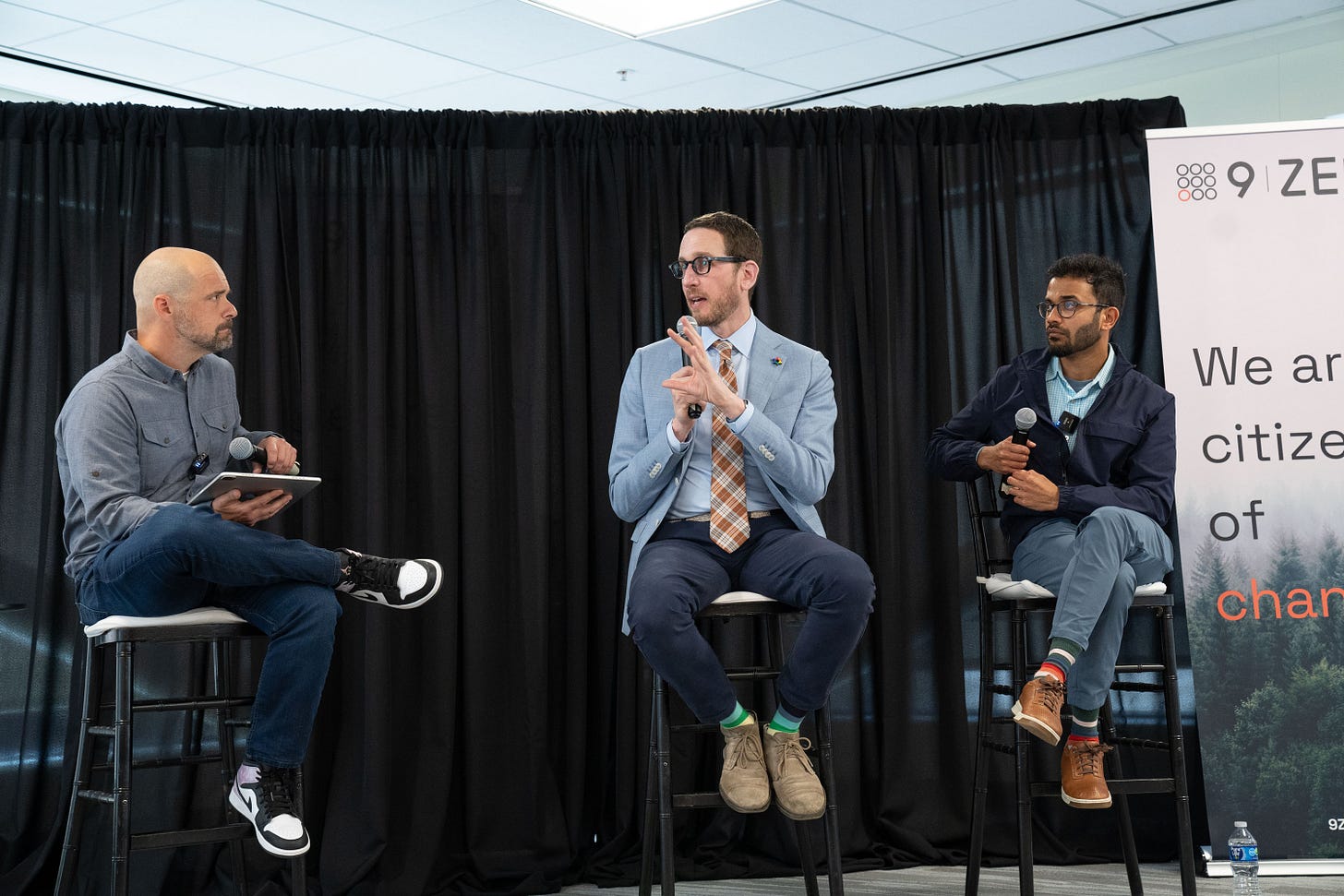Carbon Removal and Climate Policy with Senator Scott Wiener and Heirloom’s Shashank Samala
MCJ Podcast Live from SF Climate Week
The mighty community of climate tech founders, investors, leaders, and more recently converged for the second annual San Francisco Climate Week. It was a marathon of wall-to-wall events covering everything from FOAK financing and the future of AI, to carbon markets, communications, and circularity.
Among several co-hosted events with our portfolio, the flagship MCJ feature was a live podcast recording and deep dive into climate policy and innovation. Cody shared the stage with two distinguished guests: California Senator Scott Wiener, the author of the recent landmark climate legislation known as California's SB 253 or the Climate Corporate Data Accountability Act, and Shashank Samala, the CEO and Co-founder of carbon removal company, Heirloom.
During the discussion, we covered a lot of ground, centered around three pivotal themes; policy initiatives and challenges, carbon removal market dynamics, and perhaps most importantly, how policy and innovation intersect.
Keep reading for a recap of everything you missed…
I. Policy Initiatives and Challenges
Senator Wiener offered a candid recollection of his journey authoring California's landmark SB 253 – the Climate Corporate Data Accountability Act. According to the Senator, SB 253 started as a seemingly unremarkable "data bill" in 2020 but swiftly transformed into a contentious three-year struggle against industry opposition. Simply put, SB 253 requires both public and private US businesses with revenues greater than $1B doing business in California to report their Scope 1, 2, and 3 emissions, beginning in 2026. The bill also requires reporting companies to get third-party assurance of their reports.
Wiener noted the intense lobbying from heavyweight groups like the U.S. Chamber of Commerce and American Petroleum Institute, who argued the bill's compliance would be burdensome and costly. All of which he states are completely false. Senator Wiener explains, “We had a whole coalition of corporations including Google, Microsoft, Apple, an amalgamated bank, IKEA and Patagonia … and so on and so forth that were already doing it.”
Contention around the bill mostly centered on the inclusion of Scope 3 emissions, which often represent up to 90% of a corporation’s carbon footprint. Wiener recounted the battle to mandate this disclosure, noting corporations' reticence to lift the veil on their true environmental impact. Another concern was the impact Scope 3 reporting could have on smaller businesses. With that in mind, Wiener ensured the legislation was implementable by allowing estimated emissions reporting for smaller suppliers:
“We gave them an option of using well-established formulas to estimate what each supplier's carbon contribution is and there is software that allows you to do that. It's very well established, and we provided that flexibility so that we were not creating a requirement that could potentially be hard or impossible to keep.”
Beyond SB 253, Shashank also spotlighted Senator Josh Becker's ambitious SB 308 – the Carbon Market Development Act. This first-of-its-kind bill seeks to forge a compliance market for carbon removals by 2045, incrementally mandating polluters to offset unavoidable emissions financially. From Shashank’s perspective, SB 308 is exciting for two reasons:
“It puts policy teeth to a net zero target. It's very detailed and incredibly comprehensive. It’s an example of legislation that is in partnership with the private and public sectors.... it also shows a massive market signal that polluters are going to have to pay for removals in the 2030s, which allows for funding to come into the sector and increase investment to carbon removal facilities that need to scale to meet that demand.”
While SB 308 could be another game changer for carbon removal, the legislation is currently stuck in the California Assembly Natural Resources Committee. Shashank hopes the bill will be reintroduced and passed later this year.
II. Carbon Removal’s Market Dynamics
Shashank gave us the 101 of a rapidly evolving carbon removal landscape, highlighting three distinct market drivers propelling demand.
First, companies with aggressive net-zero commitments are leading the charge, recognizing carbon removal as a crucial component to address hard-to-abate emissions.
Next up, Shashank noted the emerging role of government procurement. For example, when the Department of Energy (DOE) validates certain carbon removal technologies, they take the guesswork out of the carbon buying process and the need for technical experts by offering up a trusted list of options for corporations to choose from.
The third and final driver propelling carbon removal demand are industries grappling with compliance markets like the EU Emissions Trading System, which have gained traction way sooner than anticipated. Major players in aviation and shipping are already committing to purchasing carbon removal credits.
Net zero commitments, government procurement and industries grappling with compliance are great, but Shashank noted how they mean nothing without market credibility. The room was reminded of the importance of ensuring permanence, additionality, and robust measurement, reporting, and verification (MRV) protocols, while also being reminded of the sector’s infancy in this area.
III. The Policy and Innovation Nexus
To put a nice bow on the conversation, Shashank and Senator Wiener met on one key message: the startup voice is indispensable in shaping climate policy. Wiener noted the stark resource disparities startups face when vying for influence against deep-pocketed corporations and formidable trade associations. Shashank's solution? Unified coalitions, despite competition. An example is the recently founded Carbon Removal Alliance (check out our pod with Executive Director, Giana Amador here).
But the buck doesn’t stop at startups themselves. “It's also empowering voices around the state, around the country, community groups, environmental justice groups, labor groups,” Shashank argued. “This is not something you think about when you start a climate tech company, but these are the voices you need to bring along. You need to knock on doors, understand, and raise awareness so that when you go to a policymaker, you are going there with a single voice.” This is not just a nicety but is necessary to scale impact and get to gigatons of removal.
Shashank also highlighted the three indispensable pillars underpinning successful climate tech ventures: technology, policy, and capital. A harmonious orchestration of these elements is pivotal, with policy acting as a catalyst for unlocking the capital and regulatory landscape essential for technological breakthroughs to thrive.
Finally, a conversation in San Francisco wouldn’t be complete without mentioning California's vanguard role in catalyzing climate action. Its policies often serve as blueprints that are replicated across the nation and globe, a phenomenon exemplified by the Low Carbon Fuel Standard's proliferation.
Final Thoughts
We are grateful to our guests for their insightful dialogue that underscores the intricate, multifaceted tapestry woven by policy and innovation in confronting the climate crisis. During their discussion, Senator Wiener and Shashank presented surprising revelations, offered candid reflections, and shared a vision for collective action. Together, they outlined an exciting roadmap aimed at catalyzing tangible and lasting impact within the carbon removal space.
✨ SF Climate Week Highlights
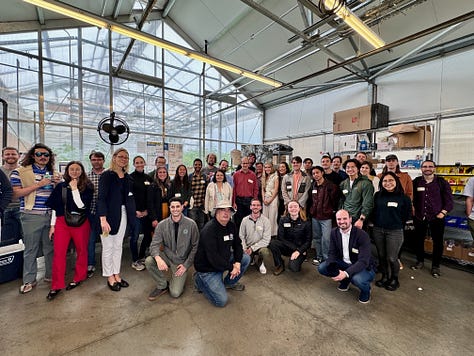

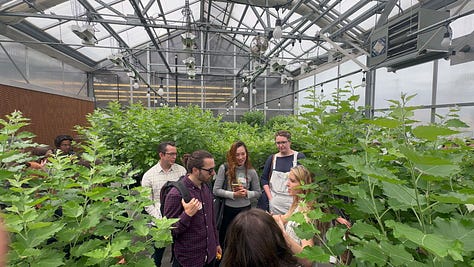

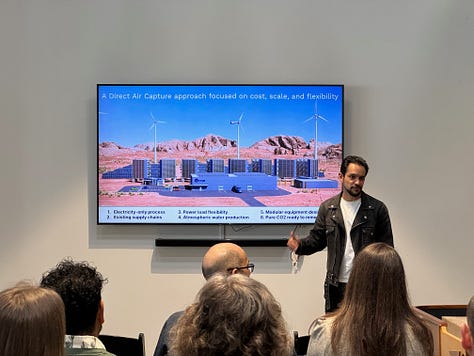
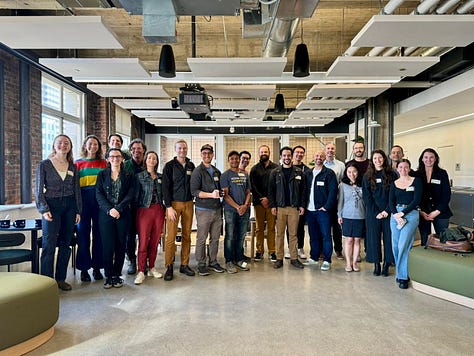
🗞️ News from the MCJ Portfolio
Nitricity launched a field trial in California's Central Valley, partnering with Olam Food Ingredients to test climate-smart nitrogen fertilizer on almond trees. The company is planning to establish a new commercial production facility in California’s Central Valley, where it will produce a locally sourced product with lower carbon emissions, directly benefiting nearby communities.
Sublime Systems was awarded $87 million from the DOE’s Office of Clean Energy Demonstrations (OCED). The award selection provides 50% of the funds needed to build and operate Sublime’s Holyoke demonstration plant, which will produce up to 30 kt/y of Sublime Cement as soon as 2026.
Windfall Bio announced its $28 million Series A. This additional funding fuels the company’s commercialization pipeline and kickstarts more pilot deployments across methane-intensive industries including agriculture, oil and gas, and waste management.
Quilt unveiled its $33M Series A, with its intelligent heating and cooling solution hitting the market on May 15. Don't miss out on the chance to be among the first to experience the future of home climate control by RSVPing to Quilt’s launch event here.
Mill partnered with Shake Shack’s Innovation Kitchen in NYC to help minimize food waste and keep their kitchens clean. The Shake Shack team has aptly named the machine ‘West Millage.’
👩💻 Climate Jobs
For more open positions, check out the #j-climatejobs channel in MCJ Slack or the MCJ Job Board.
Team Lead, Accounts Receivable & Remittance at Arcadia (Remote)
Field Services Engineer at Charm Industrial (Wichita, KS)
Mechanical Engineer at Clean Crop Technologies (Springfield, MA)
Business Development Manager at Crusoe (San Francisco, CA)
Senior Project Analyst at Euclid Power (Remote)
Process Engineer, Regeneration at Heirloom (Brisbane, CA)
Biomass Utilization Operations Manager at Kodama Systems (Remote)
Founding Designer at Kopperfield (Remote)
Manager, Software Engineer at LevenTen Energy (Seattle, WA)
Staff Electrical Engineer at Lightship (Broomfield, CO)
Staff Data Engineer at Pachama (San Francisco, CA)
🗓 Events
Click the event title for details & RSVP info.
👨💻 MCJ + Climate People Climate Career Advancement Meetup: Join us for an interactive climate interview workshop with interview expert and founder Steven Zhang! Steven put together an exhaustive guide on interviewing best practices and will join us in diving deep into this guide and sharing his proven tactics. (Weds, May 8)
🌱 Climate DC Meetup: Co-hosted with Daniel Kriozere, a great person to connect with if you're interested in learning about the climate capital stack. (Thurs, May 9)
👋 MCJ Community Welcome Call: Connect, share and learn with the MCJ community and team members. (Thurs, May 16)
💡 MCJ Boston x Climate Changemakers Hour of action x Climate Tech Social: In 60 minutes, get up to speed on a timely climate policy issue, learn how to create impact, and take real action! (Thurs, May 16)
🚺 Women in Climate Meetup: Monthly virtual meetup for women who work in, or want to work in, climate. (Weds, May 29)
The MCJ Collective Newsletter is a free weekly email curating news, jobs, My Climate Journey podcast episodes, and other noteworthy happenings in the MCJ member community.
💭 If you have feedback or items you’d like to include, feel free to reach out.
🤝 If you’d like to become an MCJ community member, apply today.
💡 Have a climate-related event or content topic that you'd like to see in the MCJ newsletter? Email us at content@mcjcollective.com


